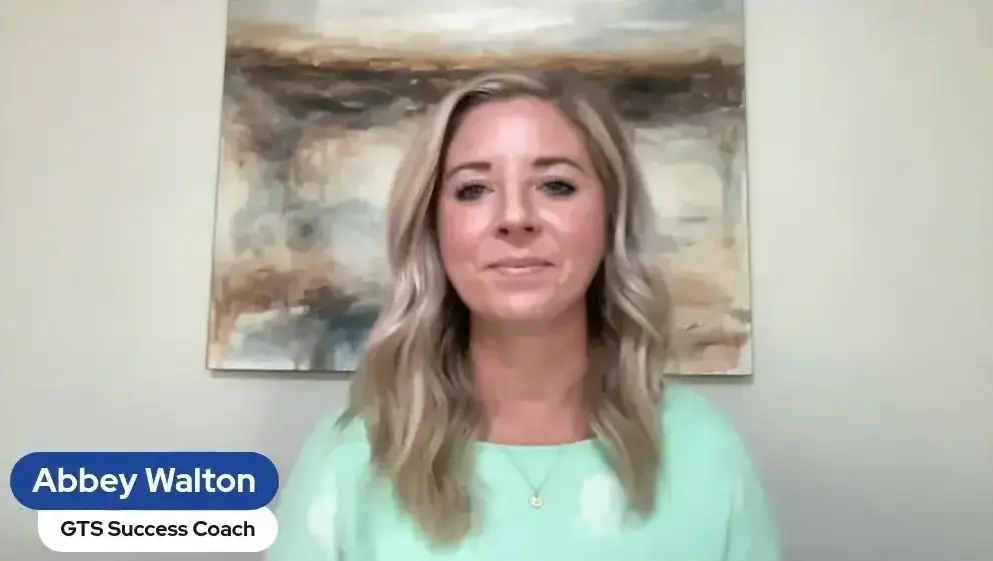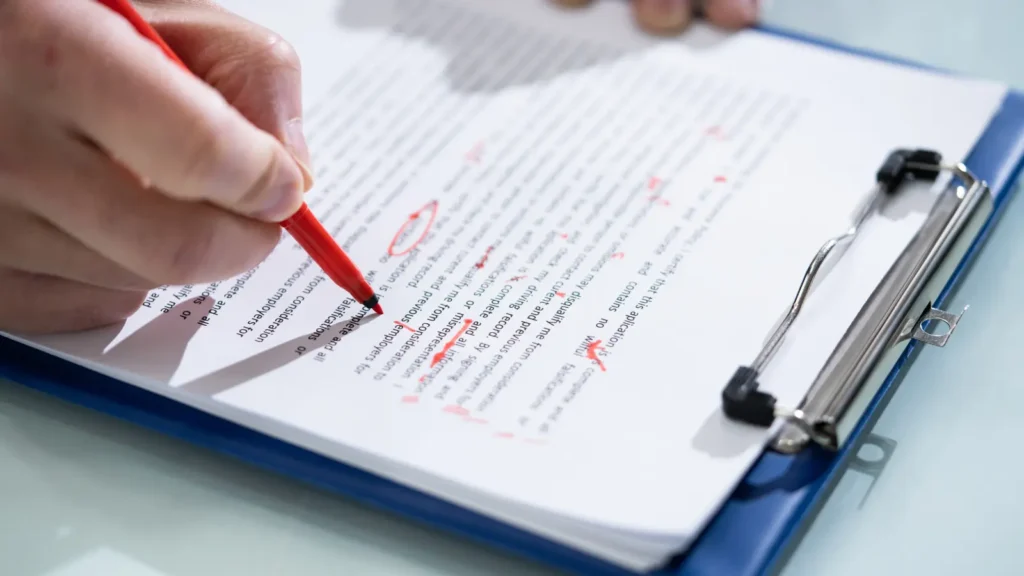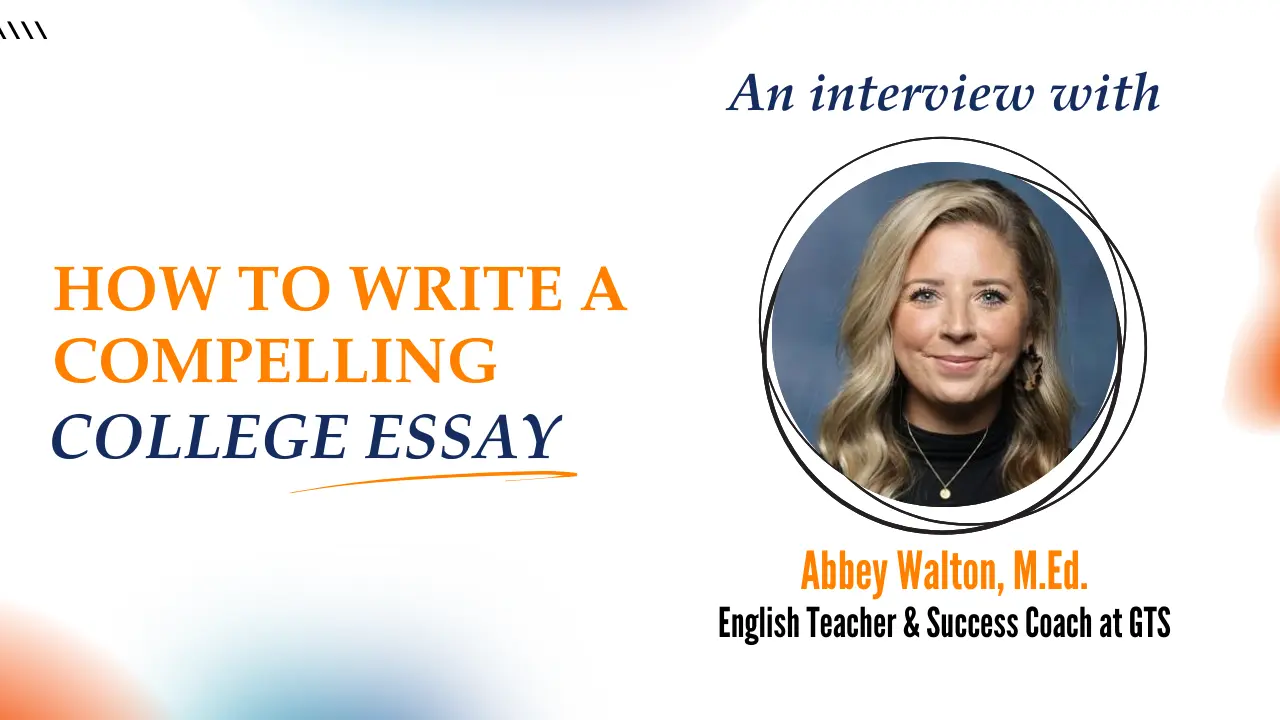College essays are a critical component of the college admissions process, offering students a platform to convey their identity, experiences, and aspirations beyond academic achievements and standardized test scores. These essays allow admissions officers to glean insights into an applicant’s personality, values, and fit for their college community. Crafting an authentic and compelling essay can significantly impact an applicant’s chances of acceptance into their desired institutions. It’s here that students can stand out, tell their story, and make a memorable impression on those deciding their collegiate fate.
In the following interview, Abbey Walton, a dedicated educator and success coach at Global Town School, shares her expertise in guiding students through the college admissions journey. With years of experience helping students achieve academic success, Abbey brings a tailored approach to each student’s unique path, empowering them to unlock their strengths and confidently navigate the application process.
Abbey discusses effective strategies for overcoming common obstacles and provides expert advice on crafting compelling college essays. Her insights offer valuable guidance for students aiming to present their stories in a way that sets them apart in a competitive admissions landscape.
Meet Abbey Walton
Bedri: Ms. Walton, can you please introduce yourself briefly?
Abbey Walton: I’m Abbey Walton. I’m a success coach at Global Town School. I’ve been in education for 13+ years as an English teacher and school administrator. I also did college counseling and college admission coaching.
When Should Students Start Thinking About Their College Essays?
Bedri: Let’s start with a question on timing! The Common App recently released new prompts for 2025, and many students are wondering when they should begin thinking about their essays. What’s your advice on the best time to get started?
Abbey Walton: While there are, of course, application deadlines, the timing of when to start thinking about your essay depends a bit on your grade level. If you’re not a junior yet, there’s no need to worry about it too much. But if you are a junior, it’s a great idea to start considering the prompts and begin building some ideas.
Tips for Rising Seniors on Starting the College Essay
Bedri: So, when would you recommend that rising seniors start actively working on their essays?
Abbey Walton: The deadline for Early Action is usually November 1st, so if you’re a rising senior, using the summertime to think about your essay and start brainstorming would be really beneficial. Even if you’re not planning to apply for Early Action, getting started by early fall would be ideal.
Overcoming Self-Reflection Anxiety in Essay Writing
Bedri: I’ve heard that college essays require a lot of self-reflection, which can make some high school students feel nervous or even a bit uncomfortable. How can they get past that?
Abbey Walton: Absolutely, it does take a lot of self-reflection, and for some students, it can be a bit uncomfortable to think about the experiences and qualities that have shaped them. But that’s why it’s so important to start the process early. Giving yourself time to think about these things makes it easier to get comfortable with sharing your story.

Planning Ahead: The Importance of Starting Your College Essay Early
Bedri: So, would you say the summer before senior year is the best time to start?
Abbey Walton: Yes, definitely! The summer before senior year is prime time to get your college essay on your radar, especially if you’re planning to apply to Early Action or if you’re working with a coach. Starting early helps ease the process and sets you up for success.
Bedri: It sounds like writing the college essay can take quite a bit of time. How long would you say students should set aside for this process?
Abbey Walton: Definitely a few months, at least! Crafting a great essay isn’t something you can just knock out overnight. Unlike a regular assignment, this isn’t something you can afford to procrastinate on. There’s so much that goes into it, and it’s not something you want to rush.
Bedri: Absolutely. It seems like getting the essay done early can really help with everything else that’s coming up during senior year.
Abbey Walton: Exactly! This essay is such a unique chance to show admissions committees who you are beyond grades and transcripts. The sooner you get it started and completed, the better, because then you can focus on everything else without added stress.
Choosing the Right Prompt for Your College Essay
Bedri: Great advice on timing! Now, my second question is about selecting a prompt. How should students go about choosing the best one, and is there a process that can help with this?
Abbey Walton: Absolutely. Most students use the Common App, which offers a range of prompt options for a reason—not everyone has the same story to tell. This essay is your chance to showcase who you are beyond grades and test scores, so selecting the right prompt is important.
One approach is to start by thinking about the most influential experiences or aspects of your life—maybe make a list of a few key things you’d like to share about yourself. Narrow down what you want to communicate outside of what’s on your transcript to help admissions get to know you better as a person.
Once you have some ideas, you can look at the Common App prompts and see which one best aligns with what you’re most passionate about or where you feel you can be the most authentic. That authenticity is really the most important part.

Bedri: What if I don’t have any extraordinary life events or challenges to write about? What kind of topics can I consider for my essay?
Abbey Walton: That’s a common concern! Many people associate the Common App essay with a dramatic life-changing event, but that’s not the only way to approach it. I always remind students that everyone has experiences that have shaped who they are, even if they might seem ordinary. Your dedication to school, your interests, and your daily life all contribute to your story.
It’s essential to choose a prompt that resonates with you personally. The Common App provides several options for a reason—because not everyone has a dramatic story to share, and that’s perfectly okay. You can write about a variety of topics. I’ve had students successfully write about their favorite book, a song that inspires them, or how their life experiences serve as a metaphor for something larger.
The beauty of this essay is its flexibility. It can go in so many different directions, and that’s what makes it exciting! Honestly, I’m a little jealous of the people who get to read these essays because I can only imagine how inspiring it must be to see the diverse perspectives of high school students.
Getting Started: Outline or Freestyle?
Bedri: How should I start my essay? Should I just freestyle my thoughts or develop an outline before I begin writing?
Abbey Walton: There’s really no one-size-fits-all approach to this—no special way to do it that’s right or wrong. My advice is to just start writing! Once you’ve chosen your topic or the prompt you’re responding to, write down whatever comes to mind first. Don’t judge yourself in the process; just let your thoughts flow and focus on how they resonate with who you are.
Authenticity is key, so use your own voice and don’t worry about grammar or structure at this stage. Those elements can be polished later. The important thing is to keep writing until you feel like you’ve captured everything you want to express.

Making Your Essay Stand Out: Authenticity, Drafting, and Feedback
Bedri: That sounds helpful! So, let’s say I’ve completed my first draft. How can I enhance my writing and make it look better and more presentable?
Abbey Walton: That’s the fun part! Once you have your first draft, you can really dive into refining it. Start by reviewing your work and identifying what’s poignant or significant about your topic—what you’re trying to convey about yourself. I suggest going through your draft and highlighting areas that feel particularly important or showcase your personality.
From there, you can revise for clarity and flow. You want your essay to read smoothly from beginning to end, with a clear structure and closure. Make sure to keep the significant elements intact while cutting away anything that doesn’t directly support your main message.
Bedri: I remember when I first started looking at accepted essays online, especially those from Ivy League schools. I was intimidated because many of them were literary masterpieces with fancy metaphors and complex language.
Abbey Walton: That’s a common feeling! It’s easy to feel like your essay has to measure up to those standards, but remember that authenticity and a clear voice are what really matter. Admissions officers want to hear your story, not a perfectly polished piece of literature. Focus on being true to yourself, and your unique perspective will shine through!

Bedri: With so many essays out there, how can I make mine stand out?
Abbey Walton: What should make your essay stand out is that it’s uniquely yours, giving readers a genuine sense of who you are. It should feel like an experience for whoever is reading it. You don’t need to embellish it with fancy language or literary elements.
A lot of students get caught up in using big words to sound smart, but that can actually detract from the message you’re trying to communicate. While you can certainly incorporate some metaphors or rhetorical strategies, the main goal is to convey your authentic self and your message clearly.
Using sensory language can really bring your essay to life, allowing the reader to feel, see, and hear the experiences you’re sharing. Remember, the admissions officers don’t know you personally, so your writing needs to create a vivid picture of who you are.
Bedri: Moving on, how many drafts should I write? I know I wrote quite a few, and how do I know when my essay is final? Who should I seek feedback from?
Abbey Walton: That’s a great question! There’s no set number of drafts you should aim for. The goal is to strive for a polished essay, but remember that a “perfect” college essay doesn’t really exist. Students often get hung up on whether their draft is good enough before hitting that submit button.
You should definitely write multiple drafts. Feedback is critical in this process. I recommend getting a variety of people to look at your essay. Ideally, you should have at least one person who knows you well to ensure your personality comes through on the page.
Also, seek out someone who can provide constructive criticism, rather than just saying, “It looks good.” I’d suggest having at least three reviewers: one who understands grammar and mechanics, another who knows you well, and a third who can give you honest, maybe even critical, feedback without detracting from your message.

Bedri: That’s helpful! I had a few current college students review my essays to get their perspectives on what would resonate with admissions committees.
Abbey Walton: That’s an excellent strategy! Current students can provide valuable insights since they’ve recently been through the process. Remember not to be too general in your responses, especially for supplementary essays.
You want to avoid cliché reasons like, “I like the school because it’s big” or “I want to go to a big school because of the weather.” Those don’t really convey why you’re a good fit for that particular institution. Focus on specifics that reflect your genuine interest and alignment with the school’s values.
Bedri: Thank you so much for joining us today, Abbey. Your insights have been incredibly helpful, and I appreciate you sharing such valuable information about the college essay writing process.
Abbey Walton: Thank you for having me! I enjoyed the discussion and hope it helps students navigate their college essay writing journey.







